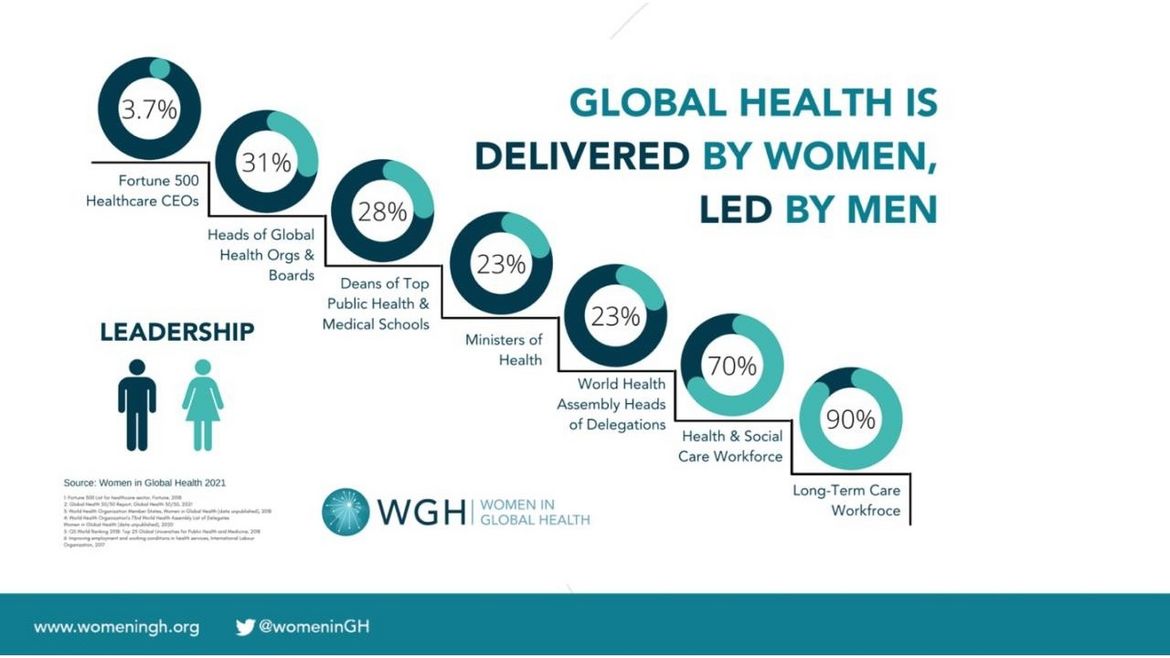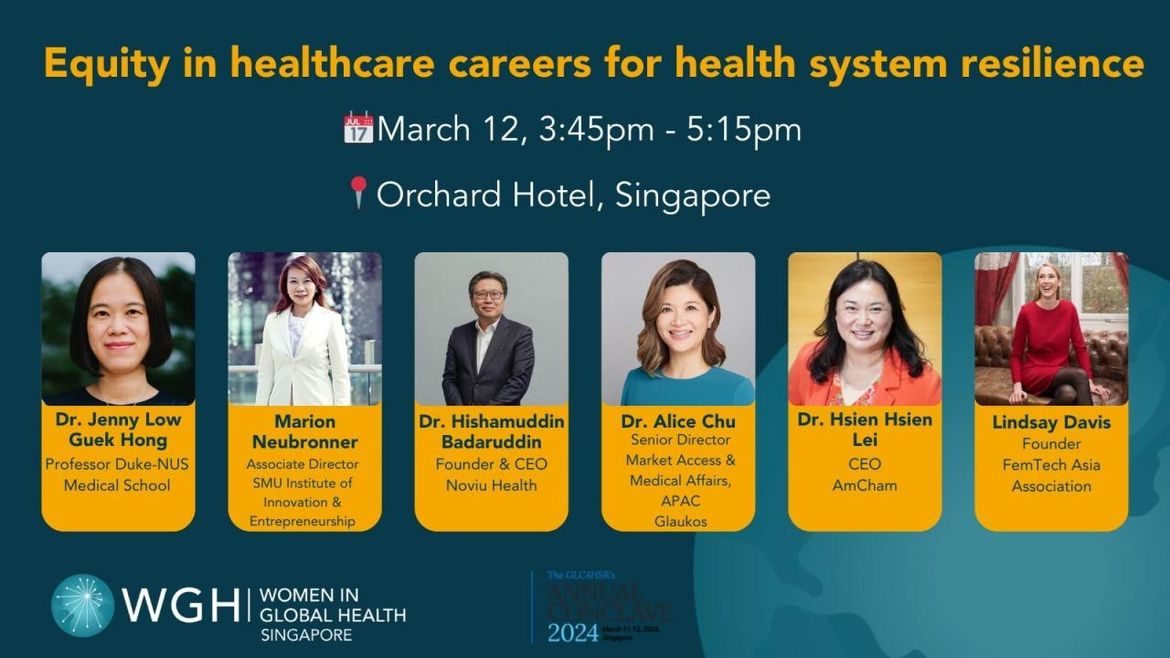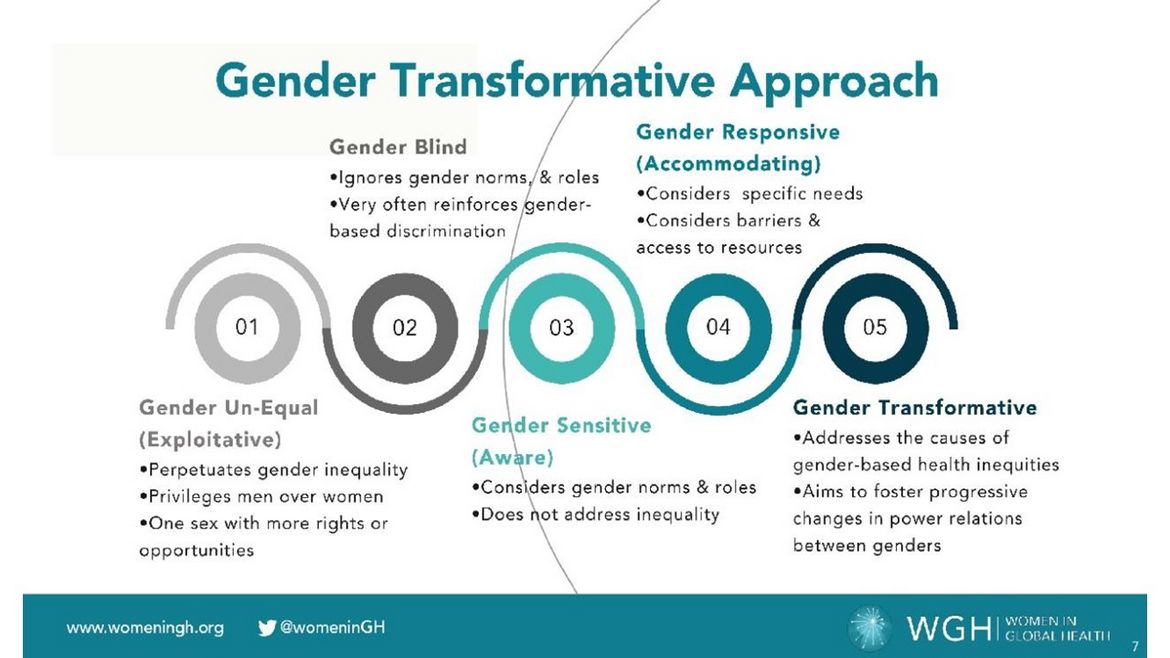Analyses & Studies • Publications
Uplifting Women's Role in Healthcare: Why Equity Matters

There is little doubt that the impact of the COVID-19 pandemic was hard on women. In addition to the effects we witnessed in the lives of our mothers, sisters, and friends, Oxfam found that globally, women disproportionately picked up the care workload in healthcare clinics, contributed to three-quarters of all unpaid care work at home and comprised two-thirds of the paid workforce, contributing trillions of dollars to their local economies.
With this in mind, we approach International Women's Day reflecting on the prevailing gender disparities in healthcare and particularly the critical role of women in healthcare service delivery. Despite advancements in women’s access to education and work opportunities, women continue to face significant challenges in career progression, equal pay, and recognition for their work and contribution.
Globally, health service is delivered by women but led by men.
Although much of the healthcare workforce doing the hands-on work are women, there are few women executives - those influential in policy and system-wide decisions - private and public healthcare systems. Globally, only 23% of health ministers are women and 28% of deans of top public health and medical schools are women. The gender pay gap is yet another concern. According to a recent collaborative report by the International Labour Organization (ILO) and the World Health Organization (WHO), women working in the health and care sector on average earn 24% less than their male counterparts. This number has shown little change since the early 2000s.

The Singapore story
One barrier to gender equity in healthcare is the gap in equal pay for women professionals. In Southeast Asia, women typically earn 30% to 40% less than men. This gap is widened by unavoidable obstacles women face such as time away from the workplace to birth and care for their children, unfair treatment in the workplace, and the mental and physical exhaustion that comes from disproportionately carrying the weight of the household responsibilities. Among the best-performing nations in Asia in terms of equity at work - China, Hong Kong, and the Philippines - base pay for men still surpasses women's by around 15%. Conversely, in Malaysia and Singapore, men earn 30% more than women for similar work. This gap widens in professional and management roles, where men earn up to 45% more on average.
As women in global health who live, work, and appreciate our Singapore lives, we recognise that this country cares for women. Recently, efforts to enhance and improve the nursing workforce have resulted in 5,600 nurses accepting offers to work in the public healthcare system in 2023. This workforce, composed mostly of women, should expect to receive better wages, job benefits, and an overall brighter professional future here in Singapore. Despite betterments in living wages, there are still improvements to be made to pave the way for women to step up to leadership positions in their industry - be it in nursing, medicine, administration, or policy. The big question remains: how do we uplift - raise to a higher position - women in both private and public healthcare systems so that they receive the same opportunities for advancement and leadership as men?
In Singapore, over 75% of primary healthcare providers are women, but senior leadership positions within university hospitals like NUHS are predominantly held by men. Similarly, women represent only 10.1% of full tenured professors at the NUS School of Medicine. In 2019, the National University Health System (NUHS) reported that women held only 21.2% (41 out of 193) of senior leadership positions. Within the NUS Yong Loo Lin School of Medicine (NUS Medicine), women accounted for 33.3% of assistant professors, 28.6% of associate professors, and only 10.1% of tenured full professors as of the same year. Meanwhile, at the National Healthcare Group (NHG), women occupied 32 out of 117, or 27.35% of the senior leadership roles in 2019. Within SingHealth, 48% of the 2,393 clinicians were women, but women only 28% of the leadership positions.
The path to the top does start at the bottom. However, policies that enhance the movement of women in nursing, hospital administration, public health, and other healthcare services, can be deemed successful only when we see more women in decision-making roles. These policies should be well-rounded, considering the role of women in their homes as well as their invaluable presence in the workplace. Low- and mid-level roles in healthcare that are predominantly held by women should not only offer adequate wages, but clear opportunities for learning and advancement. In Singapore in 2002, an outdated policy placing a one-third quota on female medical students was lifted, a change influenced greatly by the efforts of the Association of Women Doctors (Singapore). Furthermore, Singapore recognises that the goal of an integrated, primary care-driven healthcare system requires gender equity and a diverse, collaborative team that can engage patients in a holistic way. Enforcing gender equitable policies in healthcare will also promote societal shifts in attitudes to view women and men on equal grounds.
The systemic impact of gender inequity
There is damage done to a healthcare system that favours men over women in the workplace. Pathways needed to promote talent are biased towards the hiring of men. Female patients are under-represented in clinical trials leading to skewed outcomes in drug development research and treatment recommendations. Only by ensuring equity and equal opportunity across healthcare careers can truly sustainable and resilient health systems be built. Women at all levels of the healthcare system need to be supported, respected, and uplifted to be leaders and strong decision-makers in their own fields.
For this to happen, women need to find themselves surrounded by a community that promotes:
- A better understanding of the sociocultural and structural barriers to healthcare careers for women;
- the generation of data on the gender equity gaps that remain across healthcare organisations;
- The development of durable solutions to address inequities, and
- A greater representation of women at all levels in the healthcare sector.
A Singapore movement for equity in women's healthcare
Women Global Health is a global movement founded in 2015. The Singapore Chapter, established in June 2023, now gathers over 65 members to discuss the barriers and enablers to women advancing in healthcare careers in Singapore. Key points of action are career opportunities, professional progression, and access to healthcare for women of all socioeconomic levels. By gathering the stories and experiences of those who are on this journey in Singapore, we identify the issues and amplify the voices of women. Join this discussion on March 12th, where we will talk about the role we can play in strengthening our healthcare systems in Singapore through the promotion of gender equity. [Register here to attend virtually].

Deliberate action needs to be taken to continue the momentum in Singapore. Committing to the work of discussing, designing, and implementing programs for women in healthcare is a necessary next step. Women in Global Health Singapore, hosted by public health advisory group ACCESS Health International, is providing the stage for gender transformation in Singapore. Singapore - with its exceptional healthcare system, forward-thinking policies, and decisive action - can emerge as a leading example of gender equity in healthcare, providing future generations with a pathway towards complete gender transformation and inclusivity.
This International Women's Day, be an agent of change, join the movement.
SOURCE: Women in Global Health Singapore



